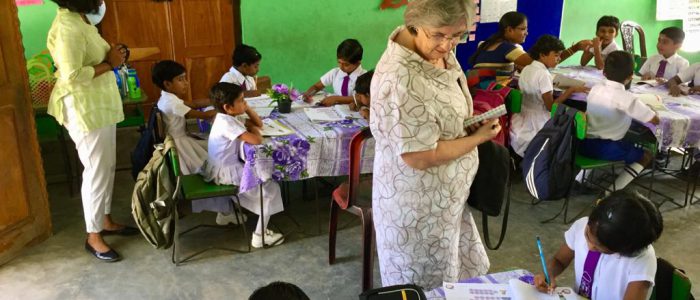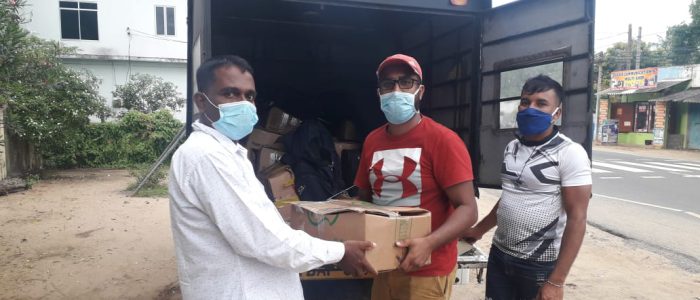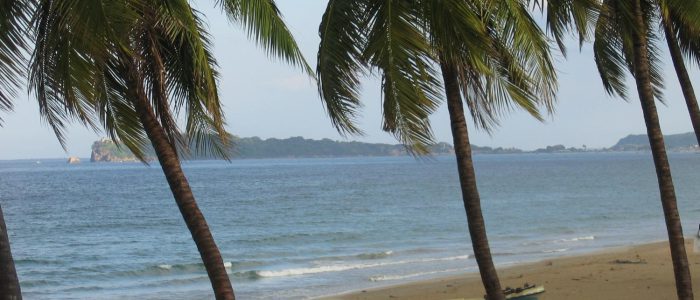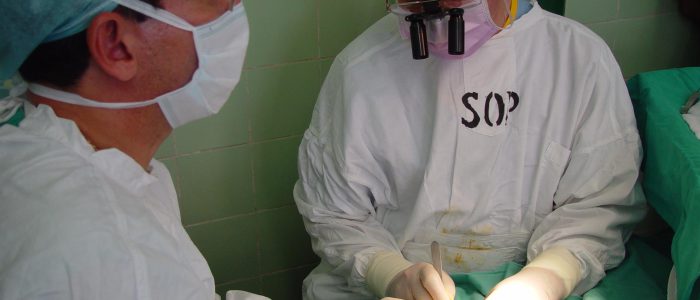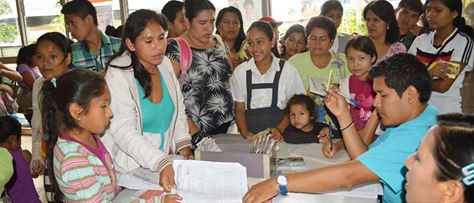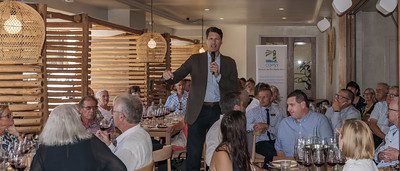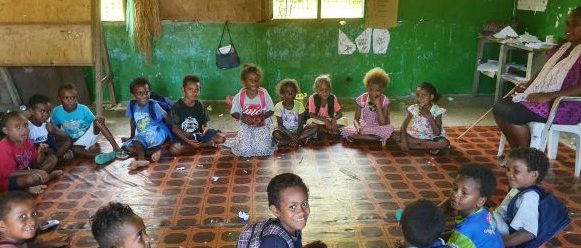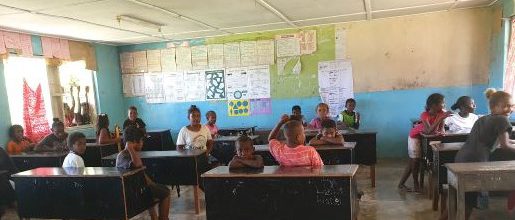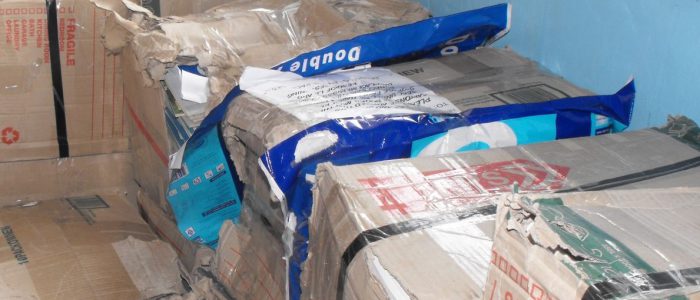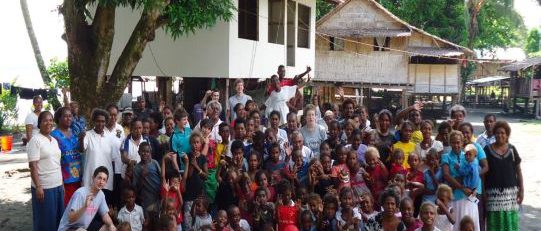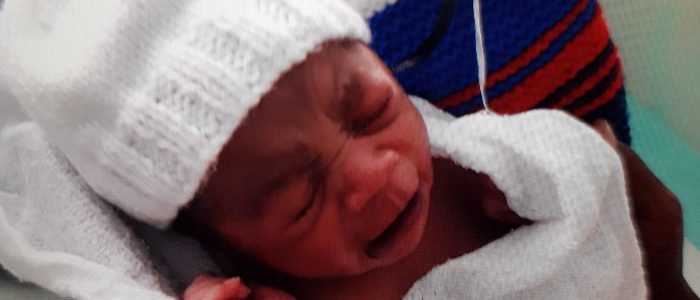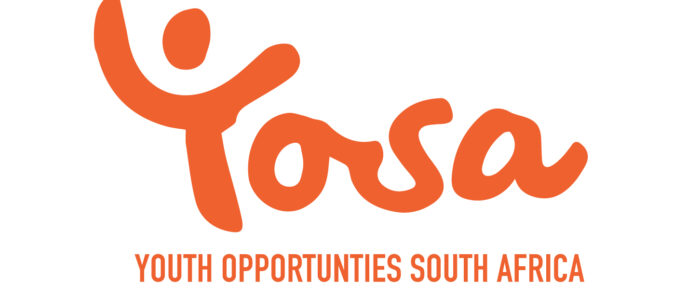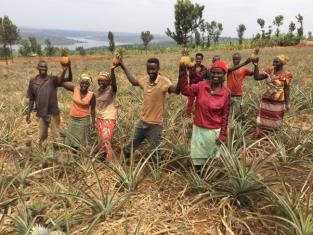
Registration is open for the 2021 Virtual Convention.
The 2021 Virtual Convention will be better than ever, opening more innovative opportunities to learn and to engage with the family of Rotary, near and far. You’ll be able to network in virtual lounges, meet new partners in service, and join fun activities with Rotary members from around the world.
This event is open to all Rotary members and participants from 12-16 June 2021. Registration fees are as follows:
- Promotional rate: US$49* through 11:59:59 (Chicago time – CDT) 7 May
- US$65 – 8 May through 16 June
*Registration must be paid in full between 16 April and 7 May to receive the US$49 rate.
Registration is also now open for the Rotaract, Youth Exchange Officer and Inter-Country Committee preconventions, which will be held 10-11 June 2021. The cost of each preconvention event is US$20.
Both the convention and preconvention events include access to the virtual House of Friendship.
Please note: Cancellations and refunds for registrations or associated events will be accepted through 11:59:59 (Chicago time – CDT) 31 May 2021. The cancellation fee is 20% of the registrant’s total fees paid. No refunds will be given after 31 May.
Virtual House of Friendship
Our virtual House of Friendship is where convention attendees gather to learn about Rotary products and services, share project information, and shop.
Those interested in showcasing their product or service should email exhibitor@rotary.org for more information or to request an exhibit application.
10-11 June Preconvention Events
Thursday 10 June
8:00 – 9:00 AM – Preconvention Opening Session
12:00 – 1:00 PM – Preconvention Breakout sessions
2:00 – 3:00 PM – Preconvention Breakout sessions
5:00 – 6:00 PM – Preconvention Breakout sessions
7:00 – 8:00 PM – Preconvention Breakout sessions
Friday 11 June
8:00 – 9:00 AM– Preconvention Breakout sessions
8:00 AM – 6:00 PM – House of Friendship
10:00 – 11:00 AM – Preconvention Breakout sessions
12:00 – 1:00 PM – Preconvention Breakout sessions
2:00 – 3:00 PM – Preconvention Breakout sessions
5:00 – 6:00 PM – Preconvention Closing Session
12-16 June Convention
Saturday 12 June
8:00 – 9:00 AM – Opening Ceremonies
8:00 AM – 6:00 PM – House of Friendship
12:00 – 1:00 PM – Convention Breakout sessions
6:00 – 7:00 PM – Convention Breakout sessions
Sunday 13 June
8:00 – 9:00 AM– General Session
8:00 AM – 6:00 PM – House of Friendship
12:00 – 1:00 PM – Convention Breakout sessions
6:00 – 7:00 PM – Convention Breakout sessions
Monday 14 June
8:00 – 9:00 AM – Convention Breakout sessions
8:00 AM – 6:00 PM – House of Friendship
12:00 – 1:00 PM – Convention Breakout sessions
6:00 – 7:00 PM – Convention Breakout sessions
Tuesday 15 June
8:00 – 9:00 AM – Convention Breakout sessions
8:00 AM – 6:00 PM – House of Friendship
12:00 – 1:00 PM – Convention Breakout sessions
6:00 – 7:00 PM – Convention Breakout sessions
Wednesday 16 June
8:00 – 9:00 AM – Convention Breakout sessions
8:00 AM – 6:00 PM – House of Friendship
12:00 – 1:00 PM – Convention Breakout sessions
6:00 – 7:00 PM – Closing Ceremonies
Background
The Fund was established by Rotary District Governor Ted Watch and his wife Nooreen (1989-90). The donations commenced in lieu of the custom of presenting flowers to the partner (wife) of the District Governor during visits to clubs. They had a grandchild needing medical treatment in Sydney and thought that others might not be able to afford the expenses associated. Tradition in District 9710 and now in D9705 is that the partner of the DG receives applications from Rotarians or Clubs on use of the funds. Any recommendations are put to the Board for approval.
Any club or a single Rotarian can make a recommendation.
Request of District Governor Michael
The request of District Governor Michael and his wife Helen is that you consider a donation to the Children’s Medical Emergency Fund. If you are prepared to do so the details of the Children’s Medical Emergency Fund account are as follows:
Bank St George
Name of account RI D9705 Inc CMEF Account
BSB 112879
Account number 479922903
Please make sure you identify your club and it would be appreciated if you also sent an email to Treasurer Rosemary Everett to let her know you have made the donation … reverett@netspace.net.au.
Thank you for considering this matter. And, if you have already made a donation, thanks very much.
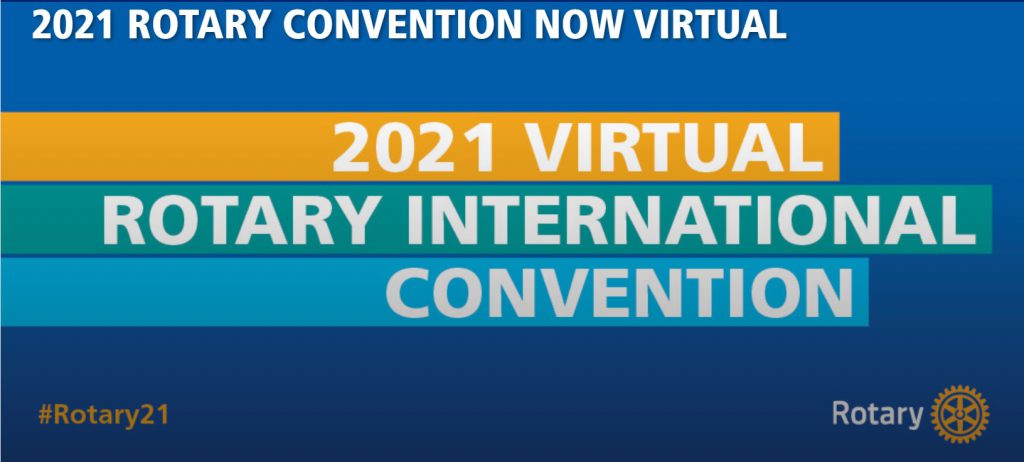
The Rotary International Convention, scheduled for 12-16 June 2021, in Taipei, Taiwan, will now be a virtual event in response to the ongoing threat of COVID-19.
We will post more details of how to register as they become available.
VOCATIONAL SERVICE MONTH
Rotary is a global network that strives to build a world where people unite and take action to create lasting change, Rotary values diversity and celebrates the contributions of people of all backgrounds, regardless of their age, ethnicity, race, color, abilities, religion, socioeconomic status, culture, sex, sexual orientation, and gender identity.
The video above produced by Rotary International in Britain & Ireland encourages Rotarians to use their particular vocational skills to make a difference to the world.
Having a broad range of vocations within each Rotary Club assists in your Club’s ability to work in your own community or internationally to achieve a better world for us all.
Rotary Action Group
This is a Rotary Action Group and RAWCS project (32-2009-10) that I have been impressed with for many years. What they offer could be incorporated into many of our existing RAWCS Overseas aid projects.
A SOLUTION THAT ENDS MALNUTRITION
We create educational materials that explain what nutritional food is, why our bodies need it and how to grow and use it. We focus on what are often neglected and underutilized plants, plants that are growing in and adapted to their environment, and are high in the most beneficial nutrients. Our materials are designed to empower people, but particularly women, so that they can make informed choices on what plants to grow and eat that will nutritiously feed themselves and their families. This project is cost effective, proven to work, sustainable and enables self-sufficiency.
We can end malnutrition – it’s as simple as growing the right plant in the right place.
Recently they were featured on an ABC Landline program that you can watch by clicking on this link – ABC Landline Program
You can see more on their website by clicking here – Food Plant Solutions
NSW Senior Volunteer of the Year – Bev Cooney, OAM, MOHpe from Bathurst
Congratulations to Bev, a member of the E-Club Serving Humanity and Honorary member of the Rotary Club of Bathurst, on being awarded NSW Senior Volunteer of the Year 2020. Bev Cooney helped establish the Dementia Café – cleverly name Dcafe – at The Neighbourhood Centre in Bathurst. Volunteers have been trained to help run the café which provides a space for people with dementia to come together, interact and maintain a sense of connection with the local community and its people.
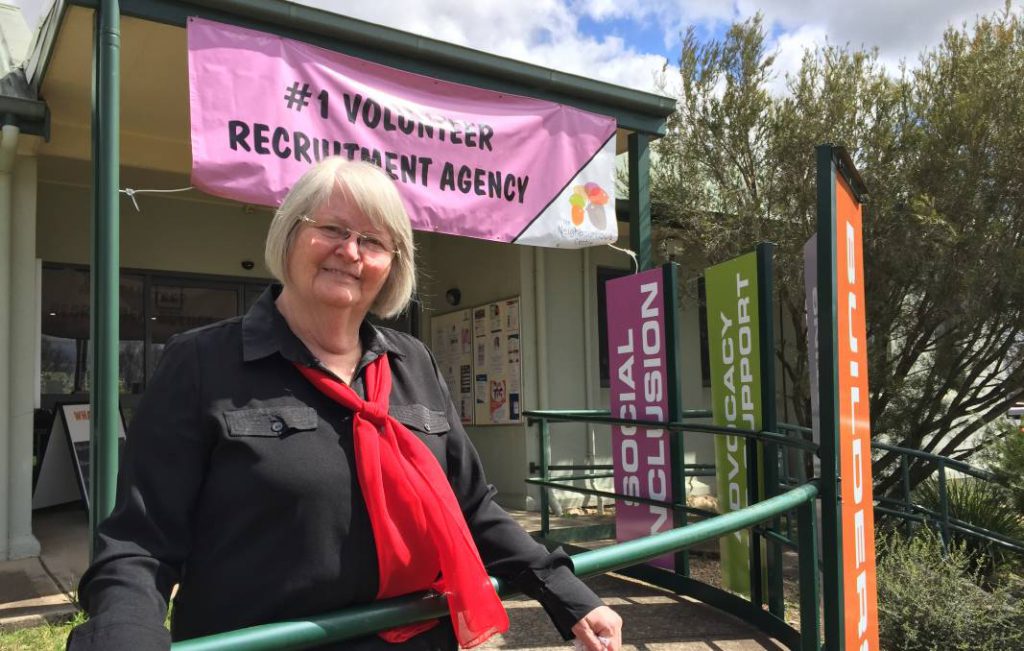
Bev is co-ordinating a volunteer program at Bathurst Hospital known as CHOPS (Confused Hospitalised Older Persons Volunteer Program.
The aim of the program for patients with dementia and delirium is to enhance the emotional care and security of patients during their stay in hospital. The program supports family and carers and the nursing staff. This includes assisting patients with eating and drinking, gentle exercise, promoting the wearing of hearing and visual aids and appropriate therapeutic activities.
In Bathurst, volunteers have made books that are of interest to patients as well as assisting nurses with handover at shift change.
Volunteers undergo an appropriate selection and training process. This volunteer program model, supported by Director of Nursing and Midwifery Brad Molenkamp, is the responsibility of nursing and allied health staff.
Bev indicates the Bathurst Hospital requires three people on each shift in the Medical, Surgical and Rehabilitation wards.
Not content with just supporting the CHOPS program in the hospital Bev has embarked on an education program to ensure Bathurst becomes a Dementia Friendly Community. With the growth in our population and the large community of retirees the instances of Dementia is growing.
Alzheimer’s Australia and the Australian Government are encouraging towns to introduce the Dementia Friendly Cities Program to make lives easier for the people who suffer this insidious disease. With three in ten people over the age of 80 and one in ten over 65 with dementia, it is timely for our community to be active.
Bev indicates that simple education programs, adjusting signs around town and by making shopping centres, cafes and restaurants dementia friendly we can improve Bathurst to be one of the most modern cities in this country.
We are proud to have Bev as a member of our Rotary Club. She has achieve much in her life assisting those less fortunate.
Bev has previously been recognised for her volunteer work in Peru. read her story below:
Bev Cooney’s Story – Chasing Dreams in Peru
06 Nov 2013
Walking through a hospital, one could be forgiven for not having their wits about them. There are clinicians and nurses darting this way and that, patients being ferried from one ward to another and concerned visitors anxiously making their way to the nearest information desk to find the whereabouts of their loved one. In this beehive of activity, there is rarely a minute to slow down and take in what’s happening around you. So slow down, and take a minute to read this.
Last month Bev Cooney, an Enrolled Nurse at Westmead Hospital, received the Medal of the Order of Australia. One would automatically assume such an award would be directly aligned with her profession. But Bev’s story is much more than that.
Bev has been a nurse for 47 years, spending most of her time working in children’s hospitals. In 2003, Bev accomplished one of her lifelong dreams of travelling to Peru in South America. She walked the Inca trail, visited untouched rainforests and saw some of the finest sites that part of the world has to offer. But the best thing she did, in her own words, was visit a “big kid’s hospital”.
“Like everybody else in Australia I thought we had nothing in our hospitals, but I soon realised we had everything. So I decided that I should help these people,” Bev said.

Bev didn’t just “help”. In 2006, she founded a school and rehabilitation centre that provides medical care and education for children and adults with disabilities and their families. She raised funds for the construction of the school and rehabilitation centre including using some of her own superannuation payout.
“The year after my first visit I took a team of surgeons, anaesthetists and nurses and we worked in the big kid’s hospital in Lima for a little while. From there we went out to the jungle with a team of local doctors to a town called Satipo, which had a 19 bed hospital, but while we were there I saw 500 kids that were disabled who could not go to school. They were not permitted to go to school,” Bev said.
This really worried her. As a nurse working with disabled kids every day in Australia, it was inconceivable to see them marginalised in another part of the world. Disabled adults also fell victim to the community’s pre-conditioned view that these adults have been punished by the gods and therefore must suffer. So in 2005, Bev began to make some enquiries.
“In 2005 I went back twice to see what it would take to build a school there. I worked out approximately what it would cost, and that I could do it with my super. So I came home and retired in 2006 and I went back and built a school for 100 kids and a house for myself to live,” Bev said.
Bev started working with the Mayor of the town and managed to acquire a place for the adult disabled and taught them how to sow and started a factory. They now make clothes and sell them in the markets, and more importantly, are no longer living on the streets.
Her extraordinary accomplishments have not come without some obstacles. Bev has been shot at, kidnapped, extorted and belittled but this has not stopped her in her quest. She’s had to return to work to continue funding the centre and move to Sydney to take on the role, but she says it has all been worth it.
Next year Bev is taking a team of plastic surgeons, anaesthetists and nurses to Satipo to operate on children who are born with cleft palates. She hopes it will inspire more volunteers to share their knowledge and time for those who need it most.
In time, Bev yearns to live in her home in Satipo permanently, but now she is happy to continue her work both in Australia and Peru. Her compassion for the children of Satipo is heart-warming, and her unassuming, humble nature is inspiring. So next time you’re hurrying through a hospital take a second to slow down, because you might just pass someone as remarkable as Bev.
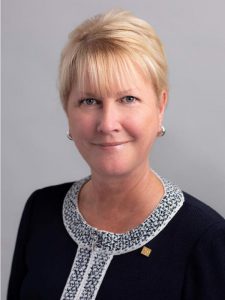
Jennifer E. Jones, a member of the Rotary Club of Windsor Roseland, Ontario, Canada, has been nominated to become Rotary International’s president for 2022-23.
A ground-breaking selection that will make her the first woman to hold that office in our organisation’s 115-year history.
Unless challenged, Jennifer will officially become president nominee on 1 October 2020.
Jennifer says she sees Rotary’s Action Plan as a catalyst for increasing Rotary’s impact. “As we reflect upon our new strategic priorities, we could have never envisioned that our ability to adapt would become our North Star during what is arguably the most profound time in recent history,”
Jennifer said in her vision statement. “Silver linings rise out of the most challenging circumstances. Using metric-driven goals, I will harness this historic landscape to innovate, educate, and communicate opportunities that reflect today’s reality.”
As the first woman to be nominated to be president, Jennifer understands how important it is to follow through on Rotary’s Diversity, Equity, and Inclusion (DEI). Statement. “I believe that diversity, equity, and inclusion … begins at the top and for us to realise growth in female membership and members under the age of forty — these demographics need to see their own reflection in leadership,”
Jennifer said. “I will champion double-digit growth in both categories while never losing sight of our entire family.”
Jones is founder and president of Media Street Productions Inc., an award-winning media company in Windsor. She was chair of the board of governors of the University of Windsor and chair of the Windsor-Essex Regional Chamber of Commerce. She has been recognized for her service with the YMCA Peace Medallion, the Queen’s Diamond Jubilee Medal, and Wayne State University’s Peacemaker of the Year Award, a first for a Canadian. Jones holds a Doctor of Laws (LL.D.).
The Four-way test is as relevant today as it was when first introduced to Rotary in 1954.
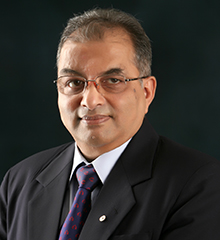
S.R. Yogananda
By S.R. Yogananda, past district governor, past regional Rotary Foundation coordinator, and a member of the Rotary Bangalore East, Bengaluru, India
The year was 1987. I had come back from the Sultanate of Oman and was running a consumer products distribution company in Bangalore, India, when a business executive came to my office one evening. He said “I have been watching the way you do business. You are not taking short cuts, you have asked your staff and accountants to follow all the government regulations. I would like to invite you to join my Rotary club.” Rotary, he said “amongst other things, stands for integrity”
After attending a few meetings, I was inducted into the Rotary Club of Bangalore East during a colorful event in a lovely atmosphere. I attended all club and district events and began to gain a deeper understanding of this wonderful organization. I was delighted to learn that Rotary does not endorse any particular religion and is beyond boundary restrictions. Integrity is a pillar on which Rotary stands.
Herbert J. Taylor, 1954-55 RI president, in his office holding a large copy of The Four-Way Test. circa 1954-55.
The story of Herbert Taylor, the past RI president who created The Four-Way Test, fascinated me, so much so that when I became president of my club I put up a large sign of the test along a busy road in Bangalore. I got it printed on a silver plate and gave it as a memento to every speaker at our meetings. I also gave it to our members on their birthdays and wedding anniversaries.
I served as the national coordinator and awards administrator for a national essay competition on The Four-Way Test held all over India, administered through Rotary clubs. This project, held for five years, was sponsored by District 6400 and the Rotary Club of Windsor, Canada.
Many times in my business, I made decisions that to an outsider might have looked unwise. There was an occasion when we could have bought a product without the taxes and sold it to make a handsome profit. When this proposal was brought to my attention, I put my foot down and said no. It failed The Four-Way Test. It was not fair to the tax authorities and to other dealers who did not have this advantage.
Another incident etched in my memory, even before joining Rotary, I was heading the special equipment division of a leading company in the Middle East. I was handling global tenders and multimillion-dollar deals. I was sitting with a top ranked bureaucrat from an important ministry who was a major customer, and he asked about the delivery of a piece of equipment that had been delayed due to a problem at the loading port. I was tempted to lie to avoid embarrassment, but working up my resolve, decided to tell him the true reason for the delay. Surprisingly, in my future dealings with him, he seemed to treat me with increased respect. Now I see this as validation of the principles behind The Four-Way Test.
The Four-Way Test is one of our great benefits as members of Rotary. It is a trustworthy ethical guide. And we have an opportunity to share it with eager young minds to the benefit of all.
The Four-Way Test
The Four-Way Test is a nonpartisan and nonsectarian ethical guide for Rotarian’s to use for their personal and professional relationships. The test has been translated into more than 100 languages, and Rotarian’s recite it at club meetings:
Of the things we think, say or do
- Is it the TRUTH?
- Is it FAIR to all concerned?
- Will it build GOODWILL and BETTER FRIENDSHIPS?
- Will it be BENEFICIAL to all concerned?
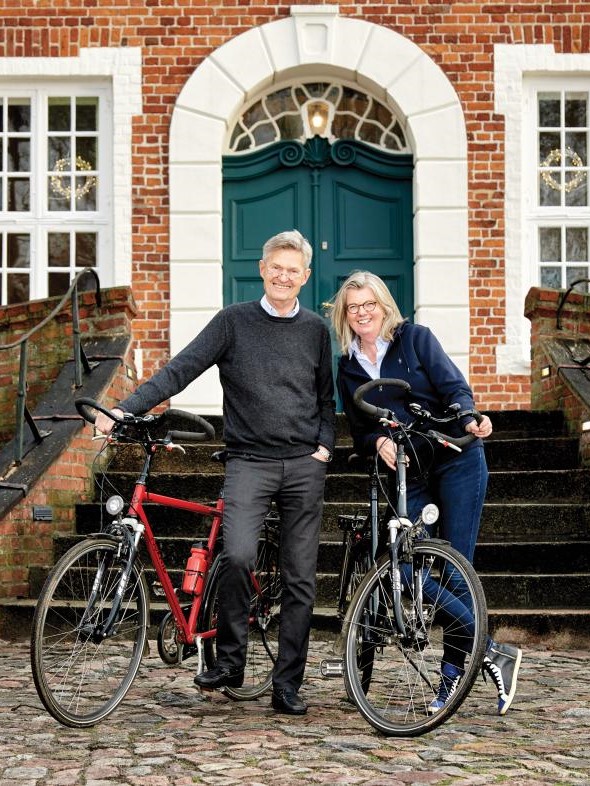
Young at heart
Holger Knaack has a fresh vision for the Rotary of the future. With a little help from his friends, things should go swimmingly
The Rotary Club of Herzogtum Lauenburg-Mölln in Germany has wrapped up its annual Christmas bazaar in the cloister of the 12th-century Ratzeburg Cathedral. Two days of selling handicrafts, mistletoe, and homemade cakes and cookies have netted the club some 8,000 euros, which this year will go to a German nonprofit that supports children who are critically ill. As the club members break down booths and put away tables and chairs, Knaack grabs the vacuum cleaner and, head down in concentration, tackles the crumbs, dirt, and bits of tinsel that litter the floor.
At this moment, Knaack is president-elect of Rotary International, preparing to take office on 1 July 2020. But at the same time he’s a regular Rotarian, a 27-year member of his club, pitching in like everybody else. “He just wants to be one friend among friends,” says club member Barbara Hardkop.
There’s a German phrase: man holt die Leute ins Boot. It means getting people on board to work together toward a common goal. In the coming year, Rotarians will find that Holger Knaack is not one to stand on the sidelines while others do the work. But equally important for Knaack is the philosophy that working hard doesn’t mean you can’t also have a good time. As he spends this year getting people on board — especially to carry out his highest priority, investing in young people — he will also be doing his best to make sure everyone is enjoying themselves.
“It’s a basic principle with Holger,” says his longtime friend Hubertus Eichblatt, a fellow club member. “When we get together, it has to be fun.”
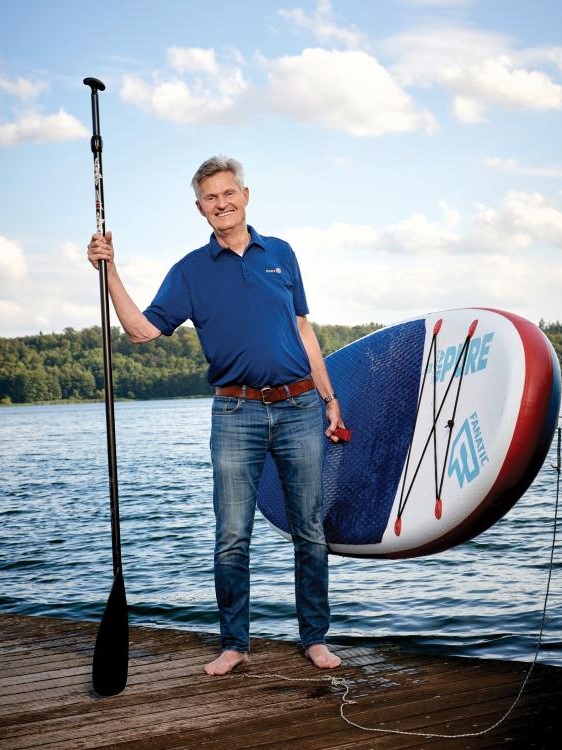
Holger Knaack is an atypical Rotary president, and not just because he wears jeans and eschews ties much of the time. He’s the organization’s first German president, and he came to that position in untraditional fashion. Unlike many of his predecessors, he didn’t rise step by step through the ranks of Rotary offices. He served as club president and district governor, but he had held only one Rotary International post, that of training leader, before becoming director. And he remembers being at a Rotary institute where people asked him what other district offices he had held before becoming governor. “I said, ‘None. None.’ All of them were very surprised,” he recalls.
What Knaack is most known for is his involvement in Rotary’s Youth Exchange program. That experience is deep, broad, and extraordinarily meaningful to him and his wife, Susanne. They have no children of their own, but they have opened their home — and their hearts — to dozens of students. “The Knaack house is always full of guests, especially young people,” says Helmut Knoth, another friend and member of Holger’s club. “They’ve had hundreds of guests over the years.”
Shortly after joining his Rotary club in 1992, Knaack helped out with a camp for short-term Youth Exchange students in northern Germany. He was immediately hooked. “I thought it was a really great program,” he says. “This is something, you’d say in German, wo dein Herz aufgeht: Your heart opens. Whenever you talk to the young people, they’ll tell you, ‘It was the best time in my life.’ Sometimes I think they are surprised about themselves, about what they are able to do, and about the possibilities that are open to them through Rotary.”
The opportunities opened for Knaack, as well. He became Youth Exchange chair for his club, and after serving as governor of District 1940 in 2006-07, he was asked to chair the German Multi-District Youth Exchange, a position he held until the day before he started his term on Rotary’s Board of Directors in 2013. Along the way, he notes, he always relied on other people. “You develop a vision together, and then let’s go ahead,” he says. “Everybody’s going a little different way; there’s never just one road. But the goal should be the same.”
Young people seem to intuitively understand Knaack’s way of doing things. “Holger has a vision, and he is executing on that vision,” says Brittany Arthur, a member of the Rotaract Club of Berlin and the Rotary Club of Berlin International. “And you recognize that this vision is not new for him. Holger and Susanne have had dozens of Youth Exchange students. Do you think they did all that so that in 2020 he could say, ‘We need to invest in youth’? This is who they are.”
Arthur also sees Knaack as unusual in his willingness to invest in “potential, not experience.” In 2012, as an Australian Ambassadorial Scholar in Germany, she had a brief exchange with him at a club meeting. That led to her speaking about her “Rotary moment” at a Berlin peace forum sponsored by 2012-13 RI President Sakuji Tanaka. After her presentation, she thought she was done. But Knaack, who had organized the forum and was now putting together a Rotary institute, had other ideas. “I had just finished speaking to hundreds of Rotarians,” she recalls. “I was feeling so great, and he said, ‘Do you want to help with the institute?’ and I said, ‘Yes!’”
Like other Rotarians, Arthur perceives the depth of Knaack’s persuasive personality. “He’s super funny and nice, but he’s dead serious when it comes to certain things. Which is why he’s such an interesting leader: He can show up on so many different levels when you need him.”“He’s super funny and nice, but he’s dead serious when it comes to certain things, which is why he’s such an interesting leader.”
Holger and Susanne Knaack love to travel, but they have lived their entire lives not far from where they were born: she in Ratzeburg and he in the nearby village of Groß Grönau, about 40 miles northeast of Hamburg. Their upbringings were remarkably similar. Each was born in 1952 and lived over the shop of the family business: Susanne’s father and grandfather were sausage makers, and Holger’s family bakery was founded by his great-great-great-grandfather in 1868. “We were very loved,” Holger remembers. “Everybody took care of you; everybody always knew where you were.”
Hubertus Eichblatt also grew up in Ratzeburg, where his sister and Susanne, whose maiden name was Horst, were childhood friends. “The Horst family had a very open house, and it’s exactly the same with Holger,” he says. “Friends are always coming in and out.”
Holger and Susanne live in the home that once belonged to Susanne’s grandmother; next door, Susanne’s sister, Sabine Riebensahm, lives in the house where the two grew up. About a decade ago, after her husband died, Holger’s sister, Barbara Staats, moved into an apartment on the top floor of that house. The two homes have a total of nine guest rooms, and what with Barbara’s 12 grandchildren, dozens of current and former Youth Exchange students, and various other friends, at least one of those rooms is usually occupied.
Every morning, everyone meets for coffee in a cozy nook off Holger and Susanne’s living room, where floor-to-ceiling windows offer views of the Küchensee, one of four lakes that surround Ratzeburg. They often lunch together as well, followed by more coffee. Then Holger has a ritual: He folds his long frame onto a little sofa for a nap while Susanne, Barbara, and Sabine continue their chat. “He likes to hear us talking while he’s napping,” Sabine says.
The four share duties, including shopping and cooking. “When someone needs something, you just shout,” Holger says. “I think this is the perfect way to live: together. The secret to anything is to ask: What’s our goal? This is exactly our goal, how we live right now.”
One Saturday in December, Holger, Susanne, Barbara, and Sabine are preparing boeuf bourguignon to serve at a dinner party for 23 close friends the Knaacks will be hosting the next day. They’re simultaneously planning the menu for Christmas, when they’ll have 15 people — 16 if a young Egyptian woman who is studying in Germany, the daughter of some Rotarians they met at a Rotary institute in Sharm el-Sheikh, takes them up on their invitation.
Helmut Knoth calls the Knaacks’ hospitality “a stroke of luck for Rotary. At least once a year we have a party there, in their beautiful garden,” he says. “When the weather is nice, we go swimming. In winter, there’s a traditional event for Holger’s birthday. We meet at the rowing club and hike around the lake.” All the birthday gifts are donations to the Karl Adam Foundation, which Knaack founded to support the rowing club. (Ratzeburg is world-famous for its rowing club, whose members formed the core of the German teams that won gold at the 1960, 1968, 2000, 2004, and 2012 Olympics. The club’s co-founder and longtime trainer, a local high school teacher named Karl Adam, is considered one of the best rowing coaches of all time and developed what’s known as the “Ratzeburg style.”)
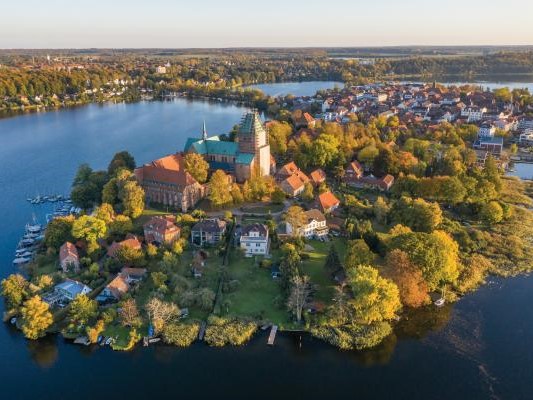
Looking through family photo albums, the Knaacks talk about childhood vacations to the seaside — Holger and his family to the island of Sylt on the North Sea, and Susanne and her family to the Baltic Sea coast. A few kilometers from their home, Holger’s family also had a small summer house with a large garden where they would spend weekends. The forests and meadows were his to explore. “It was a perfect childhood,” he says.
Holger’s boyhood home was situated about 500 meters from a small river, the Wakenitz, that formed the border with East Germany. “For me, that was really the end of the world,” he remembers. In the summer, he and his friends would test their courage by swimming across the river. On the other side was a swamp, a minefield, and watchtowers manned by East German guards. After the fall of the Berlin Wall in 1989, he says, “the first thing we did was to explore the other side by bicycle. All the watchtowers were open. I had never seen our own village, or our own house, from that perspective.”
As a young man, on holidays and weekends, Holger worked as a driver for his family bakery. After finishing secondary school he learned the trade, working in another bakery for two years for his Ausbildung, or apprenticeship. “So I can bake a lot of things,” he says cheerfully. “And I still like to bake. You have to love what you do in order to be very good. Whatever marketing techniques you may use, it’s all about the quality. Quality is about loving the product and trying to make it the best you can. But you have to take your time. That’s the secret to many things.”
After completing his Ausbildung and another year of internship in a large bread factory in Stuttgart, he went to the city of Kiel to study business administration. At the first student assembly, he caught sight of his future wife. “I saw Susanne on the 20th of September 1972,” he says. “I remember that quite well.”
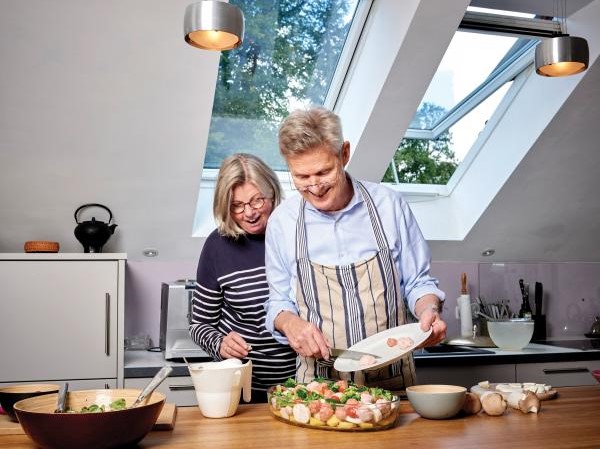
Holger didn’t make the same impression on Susanne, perhaps because there were 94 men and only three women in their class. But they soon got acquainted, and on weekends, they would drive home together to each work in their family’s business. Before returning to Kiel on Sunday evenings, they would load up the car with bread from the Knaack bakery and sausage from the Horst shop. “Our friends always knew to come over on Mondays,” Susanne says with a laugh.
They graduated in 1975 and got married the next year. Each of them continued to work in their own family’s business. At the time, the Knaack bakery had several shops and about 50 employees. After taking over from his father in the late 1970s, Knaack decided to expand the company. He also decided that he wanted to know exactly where the grain used to bake his bread was coming from. So he turned to his friend Hubertus Eichblatt, a farmer, who started a cooperative with other farmers. Knaack also worked with Günther Fielmann, Europe’s largest optician, who invested in cultivating organic grain on his own farm, Hof Lütjensee. Together Knaack and Fielmann built their own mill and marketed organic baked goods —something new 30 years ago. “Holger was always very innovative,” Eichblatt says, “very forward-thinking about those kinds of things.”
Another of Knaack’s innovations was to move the baking of the bread into the shops. Before that, bread was baked in the factory and the loaves were trucked to the shops. Knaack’s idea was to continue to make the dough in the factory, but then to freeze it in portions that were distributed to the shops to be baked. His motto was Der frische Bäcker – “the fresh baker.” Today, almost every bakery in Germany does it that way.
Knaack kept expanding the business; eventually there were about 50 shops and the factory with hundreds of employees. He received an offer to buy his company from an internationally active firm that was investing in bakeries. It was a very good offer, and Knaack took it. Still a young man in his 40s, he pursued other business ventures and took up golf (and was quickly tapped to be president of his golf club). He had been an active member of Round Table, an organization for people under age 40; at 39, he joined the Rotary club in the nearby town of Mölln (remaining a member there even when a new club was chartered shortly afterward in Ratzeburg with many of his friends as members). And before long, he found his calling with Rotary Youth Exchange.
Medieval Ratzeburg, with its ancient cathedral and half-timbered burghers’ houses, is situated on an island surrounded by four glacial lakes. The northern German state of Schleswig-Holstein is dotted with such lakes; winding roads lead through rolling green countryside past farms and villages built in the characteristic regional style of brick architecture. But the students who have stayed with Holger and Susanne have found something much deeper than a picture-postcard experience of Germany.
Juraj Dvořák was one of the first students the Knaacks hosted, in 1996. After returning home to Slovakia, the 16-year-old sent a card to Holger and Susanne, who invited him back for another visit. But when Dvořák’s father died of a heart attack, the young man told the Knaacks he couldn’t come after all. Holger and Susanne, along with Dvořák’s mother, insisted the visit go on as planned.
“I stayed one month with them, and they did everything to help me,” Dvořák recalls. “Since then we have been close friends. If I had not met Holger and Susanne, and if they had not mentored me in many aspects of my life, I would not have achieved what I have.” Dvořák now heads a private equity company in Vienna, but he’s not talking about material success. “I went from zero to somebody, not in terms of money, but in terms of a healthy personality.”
He and Holger “always had deep discussions,” says Dvořák, who still visits every year. “He told me that money is not the most important thing, that I have to enjoy my work and I should also enjoy life. He told me I should travel and see the world. And he took me to many meetings with his friends, Rotarians. I didn’t understand why at the time, but when I got older, I realized it was an absolutely unique chance to learn how to behave with people you don’t know. He grew me up.”
About Holger and Susanne, he says: “They have a big heart and a strong responsibility for the people they are mentoring. They are different from other people. They are championship league people.”
The Knaacks take that responsibility to mentor students seriously. “The major goal of Youth Exchange is to dive into another culture, to learn everything you can about that culture,” Holger says. “And the amazing thing about Youth Exchange is that parents send their kids around the globe and trust that Rotarians will treat them like their own children. It’s something that makes us unique. No other service organization does it this way.”
Paula Miranda spent three months with the Knaacks, who were her first hosts during her exchange year in 2008. She arrived in Ratzeburg from her home in Argentina in January: “I remember it was 4 p.m. It was already dark in Germany, and I was like, oh, my God, where am I? And they welcomed me with a German meal.”“Holger told me that money is not the most important thing, that I have to enjoy my work and I should also enjoy life.”
When Miranda turned 19 a month later, Holger and Susanne organized a birthday party with some of her new friends from school. “They made barbecue asado like we do in Argentina,” she recalls. “They wanted to make me feel at home, and I really appreciated that. My year wouldn’t have been the same without them. I really love them.”
Alois Serwaty, a past governor of District 1870, first met the Knaacks 25 years ago at a German Multi-District Youth Exchange conference. “Both Holger and Susanne have an uncomplicated and open manner that appeals to and motivates young people,” he says. “When you meet them, you recognize right away that they like young people. Holger’s attitude is that Rotary must remain young and that working for and with young people keeps you young.”
Dvořák agrees: “I was with Holger in December, and he has not changed in 24 years. He’s still the same, maybe just some wrinkles. This Youth Exchange program gives him energy.”
A phrase you hear often among German Rotaractors is auf Augenhöhe begegnen — to meet someone at eye level. “That means everyone is equal, on a level playing field,” Susanne says. “It doesn’t make any difference if someone is a director or a driver. You discuss something and come up with a solution without the other person feeling like he’s received an order.”
According to his friends and family, Holger has a real flair for this. “If he can’t do something himself, he can delegate really well,” Susanne laughs. “He can recognize who would be good at something. It’s a talent of his.”
One example, she says, is the success he had working with Rotaractors on the Rotary institute in Berlin. “They said, ‘We’ll do the breakout sessions,’ and instead of saying, ‘You can’t do that,’ he said, ‘Go ahead.’ He trusts people to succeed. But he’s still in the background keeping an eye on things. It was the same for the convention in Hamburg,” where Knaack and Andreas von Möller were co-chairs of the 2019 Host Organization Committee. “There were lots of Rotaractors involved there too.”“We need to take care of our Rotary clubs, and our friends in our clubs.”
One of her husband’s main goals, Susanne says, is to continue to bring Rotary and Rotaract closer together. “He’s excited about what he wants to accomplish.” And when he’s excited about something, “he’s able to get others excited as well,” adds Susanne’s sister, Sabine. As Brittany Arthur noted, “You feel like you’re investing in his vision.”
Over cappuccinos in the sunny cafe of Ratzeburg’s Hotel Seehof, with its views of the sparkling Küchensee, Knaack’s friends Hubertus Eichblatt, Helmut Knoth, Jens-Uwe Janssen, and Andreas-Peter Ehlers — like Holger, all members of the Rotary Club of Herzogtum Lauenburg-Mölln — agree that he possesses a certain genius for marshaling volunteers. Ehlers remembers how it was when he served as district secretary during Knaack’s year as district governor. “Before that time,” he says, “under other governors, it was always ‘somebody should do this’ or ‘who is going to do this?’ But Holger would say, very specifically, ‘Hubertus, I’ve been thinking about it, and you’re the perfect person to do this. Here’s how I envision it. This is just right for you, Hubertus, I would really love it if you did this. It’s great that you’re going to do this!’ The way he puts it to you, you can’t say no. And you do it gladly, because he doesn’t hand it to you and then walk away. He comes back in a month and asks, ‘Hubertus, everything going OK? Can I help with anything?’ ”
Eichblatt laughs at this depiction, but stresses that Knaack is successful because his enthusiasm is infectious — and because he sets the example: “He exemplifies these positive characteristics, so it’s relatively easy for him to convince people to do things.”
As they chat about Knaack’s good qualities, they echo what many people say — that he’s never in a bad mood. But close friends that they are, they insist he’s not perfect. “We have to find a weakness,” muses Eichblatt, before settling on a benign character flaw. “He’s very fashion-conscious. His glasses!”
The mention of Knaack’s signature eyewear elicits an immediate reaction from the group. “He’s the only one who wears glasses like that,” Ehlers says. “And if they break, no problem: He has another pair!”
“They’re his trademark,” Knoth adds. “I’ve only ever known him to wear these glasses. And he seldom wears a tie. Jeans, always. He looks youthful. He is youthful!” The old friends nod and laugh as they finish their cappuccinos.
Knaack’s philosophy — that no matter how hard you work, you should also have fun — applies especially to Rotary. “Traveling around, talking with people, is really fun for him,” says Susanne, a charter member of the Rotary E-Club Hamburg Connect. “Rotary is fun for him — and it’s just as much fun for me.”
Knaack wants everyone to enjoy Rotary — and to be proud to be part of it. “All of us love this organization, and all of us should feel we ought to do something to make Rotary stronger,” he insists. “It’s not hard to do more: be more involved in your club, more interested in your friends, more involved in projects and programs. Ask yourself: Is our club involved in youth service? Can we come up with better ideas for fundraising? And the club also has a responsibility to make people feel good, feel welcome, feel proud. It has to feel special to be a Rotarian.”
As he thinks about the year ahead, he notes that a Rotary president gets invited to lots of events, including district conferences, and sends a representative to most of them. But Knaack plans to attend — if only virtually — the conference in District 1940, whose governor this year, Edgar Friedrich, is a member of the Rotary Club of Herzogtum Lauenburg-Mölln. “I think you’re allowed to make an exception for your own district, especially if the district governor is from your own club,” Knaack says. “Your Rotary club is really important. Whatever office you have had in Rotary, and however important you were, at the very end, you’re always a member of your own Rotary club and happy to be among your friends.
“That’s why we need to take care of our Rotary clubs, and our friends in our clubs. It doesn’t matter if you were president. At the end, it’s important that you’re among friends.”
• This story originally appeared in the July 2020 issue of The Rotarian magazine.
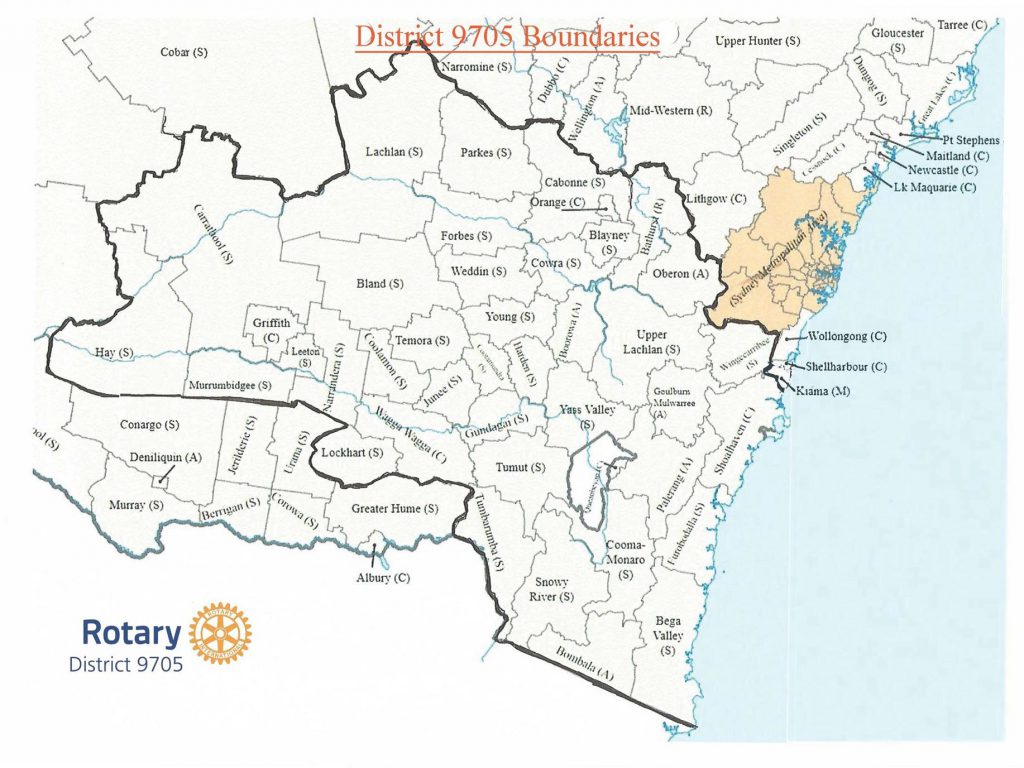
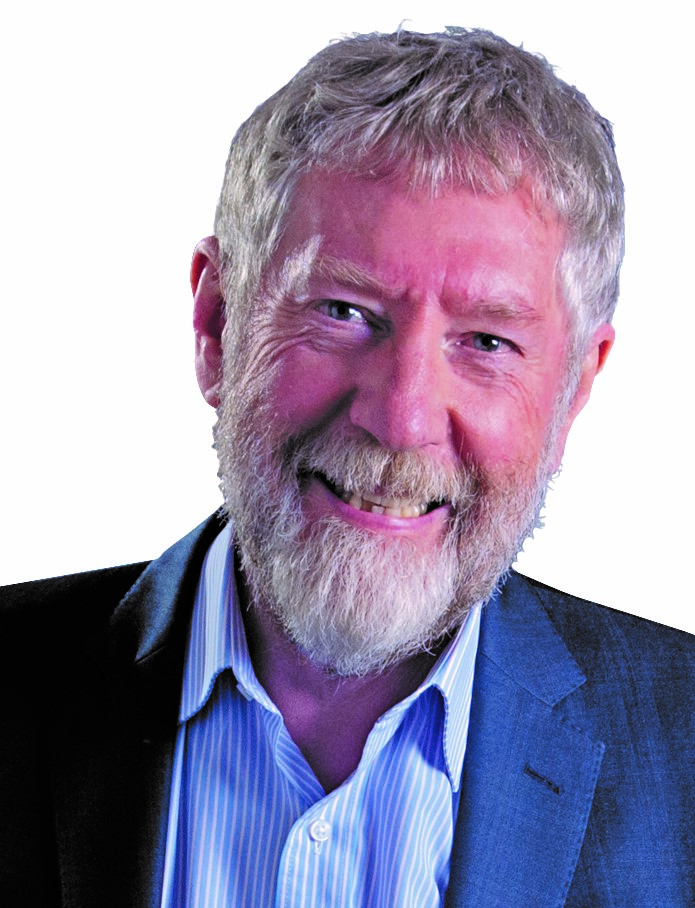
On 1st July 2020 our new Rotary District 9705 became a reality with the merging of the two Districts 9700 & 9710.
At the District Changeover held via ZOOM Webinar, the District Governors for 2019-20, John Mackenzie for D9700 and Peter Ford for D9710 reviewed their years and handed over to D9705 Governor for 2020-21, Dr. Michael Moore AM PhD.
Dr. Michael Moore AM PhD – A short Curriculum Vitae
Personal
• Dual citizenship – Australian and Canadian
• Married with three adult children
Roles Held
• Inaugural Rotary District 9705 District Governor
• CEO – Public Health Association of Australia Inc (2008 – 2018)
• President World Federation of Public Health Associations (2016-2018)
o President Elect (2014 – 16)
o Chair Immunization Taskforce (2019 ongoing)
• Chair and member of series of Boards
o Currently Chair National Drug Research Institute at Curtin University
o Member Soils for Life
o Member: Community Advisory Committee Charles Sturt University
• Company Director – MooreConnections Pty Ltd
o Consultancy in Health and eGovernment / National and International
• Small-medium Business Owner/Manager – Psychedeli Cafe with 18 staff
• Government Minister –
o First Australian Independent to be appointed Minister
o Health and Community Care, Corrections and Housing
• Leader of the House – ACT Parliament
• Member of Parliament – Independent MLA in the ACT for four terms
• Political and social columnist – City News a Canberra weekly newspaper since 2006
• Teaching: Tertiary and Secondary Teacher, Secondary School Faculty Head
Academic
• Distinguished Fellow: The George Institute of Global Health (University of NSW) from 2018
• Adjunct Professor at the University of Canberra since 2001
• Bachelor of Arts (Flinders University)
• Post Graduate Diploma of Education (Adelaide University)
• Master of Population Health (Australian National University)
• PhD University of Canberra – Power, Politics Persuasion: The Critical Friend in Public Health Advocacy
• Over 500 articles in peer reviewed journals, newspapers, blogs, book chapters and magazines
Recognition
Rotary
• Paul Harris Fellow (Awarded by the Rotary Club of Canberra in 2010 )
• President: Canberra Club 2007/08 with Presidential Citation
Other
• Member in the General Division of the Order of Australia (AM)
• Sidney Sax Public Health Medal (Public Health Association of Australia
• Life Member Public Health Association of Australia
• Health in All Award 2014 – (University of NSW)
• Justice Gerald Le Dain Award for Achievement in the Field of Law (Drug Policy Foundation USA)
• Aids Action Council President’s Award 2001

